reflective writing
- 格式:doc
- 大小:26.50 KB
- 文档页数:4
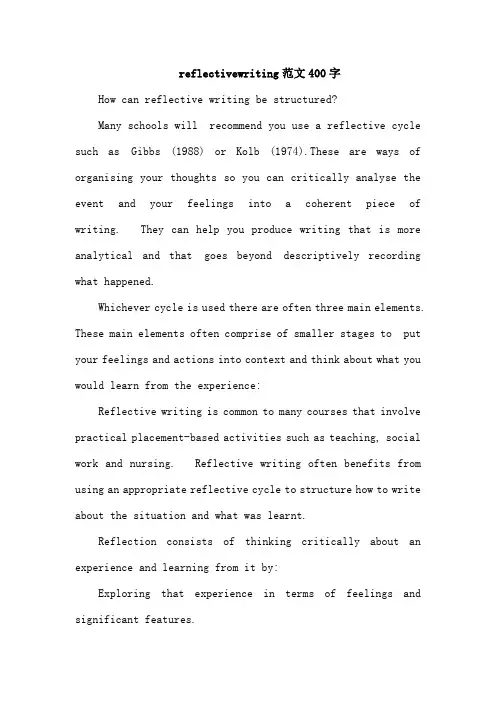
reflectivewriting范文400字How can reflective writing be structured?Many schools will recommend you use a reflective cycle such as Gibbs (1988) or Kolb (1974).These are ways of organising your thoughts so you can critically analyse the event and your feelings into a coherent piece of writing. They can help you produce writing that is more analytical and that goes beyond descriptively recording what happened.Whichever cycle is used there are often three main elements. These main elements often comprise of smaller stages to put your feelings and actions into context and think about what you would learn from the experience:Reflective writing is common to many courses that involve practical placement-based activities such as teaching, social work and nursing. Reflective writing often benefits from using an appropriate reflective cycle to structure how to write about the situation and what was learnt.Reflection consists of thinking critically about an experience and learning from it by:Exploring that experience in terms of feelings and significant features.Processing the significant features and identifying learning.Finding new solutions to dilemmasUsing the process as a tool to help develop future practice.Reflective writing therefore:Records for future reading how you feel about an experience before, during and after the event.Provides a way of general listing feelings about specific events to similar events and situations.Allows you to relate your feelings and experiences to the perspectives of others.Enables you to stand back and evaluate your feelings.What? (description)What was the event? When? Where? Who was involved?So what? (interpretation)What is most important aspect of the event/idea/situation?Why did this occur?How can the event and your feelings be explained?Could anything have gone differently?How do the stages of the event relate to each other?Is this event/feeling similar to/different from others that you or other people have experienced?Now what? (outcome)What have I learned?What are the implications for my future practice (would anything be done differently)?。
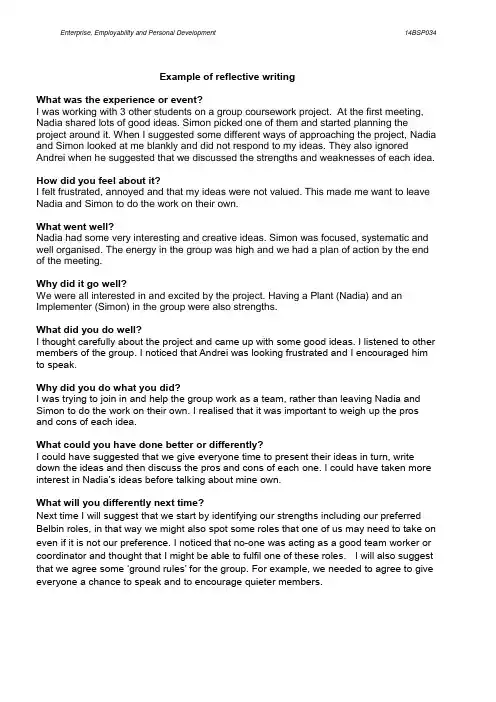
Enterprise, Employability and Personal Development 14BSP034Example of reflective writingWhat was the experience or event?I was working with 3 other students on a group coursework project. At the first meeting, Nadia shared lots of good ideas. Simon picked one of them and started planning the project around it. When I suggested some different ways of approaching the project, Nadia and Simon looked at me blankly and did not respond to my ideas. They also ignored Andrei when he suggested that we discussed the strengths and weaknesses of each idea. How did you feel about it?I felt frustrated, annoyed and that my ideas were not valued. This made me want to leave Nadia and Simon to do the work on their own.What went well?Nadia had some very interesting and creative ideas. Simon was focused, systematic and well organised. The energy in the group was high and we had a plan of action by the end of the meeting.Why did it go well?We were all interested in and excited by the project. Having a Plant (Nadia) and an Implementer (Simon) in the group were also strengths.What did you do well?I thought carefully about the project and came up with some good ideas. I listened to other members of the group. I noticed that Andrei was looking frustrated and I encouraged him to speak.Why did you do what you did?I was trying to join in and help the group work as a team, rather than leaving Nadia and Simon to do the work on their own. I realised that it was important to weigh up the pros and cons of each idea.What could you have done better or differently?I could have suggested that we give everyone time to present their ideas in turn, write down the ideas and then discuss the pros and cons of each one. I could have taken more interest in Nadia’s ideas before talk ing about mine own.What will you differently next time?Next time I will suggest that we start by identifying our strengths including our preferred Belbin roles, in that way we might also spot some roles that one of us may need to take on even if it is not our preference. I noticed that no-one was acting as a good team worker or coordinator and thought that I might be able to fulfil one of these roles. I will also suggest that we agree some ‘ground rules’ for the group. For example, we needed to agree to give everyone a chance to speak and to encourage quieter members.。
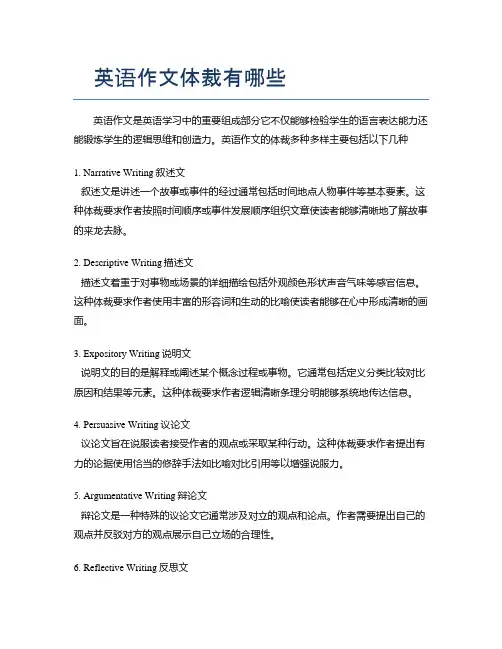
英语作文体裁有哪些英语作文是英语学习中的重要组成部分它不仅能够检验学生的语言表达能力还能锻炼学生的逻辑思维和创造力。
英语作文的体裁多种多样主要包括以下几种1. Narrative Writing叙述文叙述文是讲述一个故事或事件的经过通常包括时间地点人物事件等基本要素。
这种体裁要求作者按照时间顺序或事件发展顺序组织文章使读者能够清晰地了解故事的来龙去脉。
2. Descriptive Writing描述文描述文着重于对事物或场景的详细描绘包括外观颜色形状声音气味等感官信息。
这种体裁要求作者使用丰富的形容词和生动的比喻使读者能够在心中形成清晰的画面。
3. Expository Writing说明文说明文的目的是解释或阐述某个概念过程或事物。
它通常包括定义分类比较对比原因和结果等元素。
这种体裁要求作者逻辑清晰条理分明能够系统地传达信息。
4. Persuasive Writing议论文议论文旨在说服读者接受作者的观点或采取某种行动。
这种体裁要求作者提出有力的论据使用恰当的修辞手法如比喻对比引用等以增强说服力。
5. Argumentative Writing辩论文辩论文是一种特殊的议论文它通常涉及对立的观点和论点。
作者需要提出自己的观点并反驳对方的观点展示自己立场的合理性。
6. Reflective Writing反思文反思文是一种个人化的写作形式作者通过回顾和思考个人经历情感或思想来表达自己的感悟和认识。
这种体裁要求作者真诚地表达内心世界与读者分享个人的成长和变化。
7. Comparative Writing比较文比较文是对两个或多个事物概念或现象进行对比分析的写作形式。
作者需要找出它们的相似之处和不同之处并分析这些差异背后的原因。
8. Process Writing过程文过程文描述了完成某项任务或活动的步骤和方法。
这种体裁要求作者按照逻辑顺序列出步骤并可能包括原因结果或个人体验。
9. Journal Writing日记体日记体是一种记录个人日常经历感受和思考的写作形式。
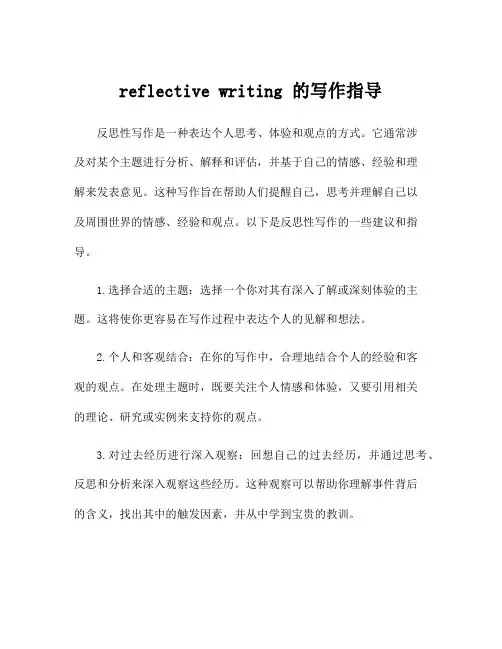
reflective writing 的写作指导反思性写作是一种表达个人思考、体验和观点的方式。
它通常涉及对某个主题进行分析、解释和评估,并基于自己的情感、经验和理解来发表意见。
这种写作旨在帮助人们提醒自己,思考并理解自己以及周围世界的情感、经验和观点。
以下是反思性写作的一些建议和指导。
1.选择合适的主题:选择一个你对其有深入了解或深刻体验的主题。
这将使你更容易在写作过程中表达个人的见解和想法。
2.个人和客观结合:在你的写作中,合理地结合个人的经验和客观的观点。
在处理主题时,既要关注个人情感和体验,又要引用相关的理论、研究或实例来支持你的观点。
3.对过去经历进行深入观察:回想自己的过去经历,并通过思考、反思和分析来深入观察这些经历。
这种观察可以帮助你理解事件背后的含义,找出其中的触发因素,并从中学到宝贵的教训。
4.批判性思维:在你的写作中运用批判性思维,提出相关的问题并寻找答案。
评估不同观点之间的优缺点,并从多个角度来分析和解释主题。
这将提升你的写作的深度和丰富性。
5.自省并表达情感:写作是一个自省的过程,在写作中尽量多表达自己的情感和情绪,让读者能够感受到你的观点和体验。
然而,也要确保你的情感和情绪能够与你的主题和论点相互协调。
6.记录模式和笔记:在写作过程中,你可能会突然想到一些有趣的点子或观点。
为了不让这些想法消失,建议养成记录模式和笔记的习惯。
这样可以确保你不会忘记那些深入的想法和观察。
7.设定目标和提纲:在开始写作之前,设定一个明确的目标,并制作一个提纲。
这有助于你构建一个逻辑性强、一气呵成的文章结构,并确保你在写作过程中不偏离主题。
8.编辑和修订:写作完成后,进行编辑和修订是非常重要的。
审查你的写作,查找语法、拼写和逻辑错误,并根据需要进行修改和重新表达。
希望这些建议和指导可以帮助你在反思性写作中取得更好的效果。
记住,反思是一个个人的过程,找到适合你的写作方法和风格,以表达自己真实的思想和情感。
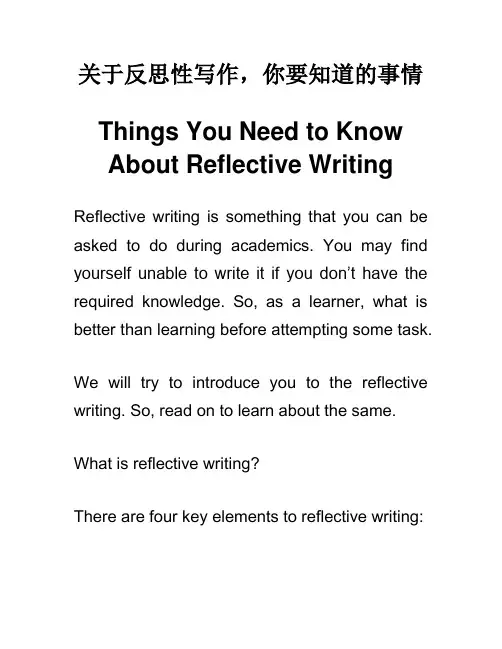
关于反思性写作,你要知道的事情Things You Need to KnowAbout Reflective WritingReflective writing is something that you can be asked to do during academics. You may find yourself unable to write it if you don’t have the required knowledge. So, as a learner, what is better than learning before attempting some task.We will try to introduce you to the reflective writing. So, read on to learn about the same.What is reflective writing?There are four key elements to reflective writing:● A critical issue gets reported and responded to this type of writing.●You have to relate the problem with the knowledge you possess about the same field.●You also have to give reasoning about the causes and effects of the problem keeping the similar theories and literature in mind.●You also have to reconstruct your thinking so that you can find out the new ways to approach the issue.What is the need to write reflectively?Writing reflectively teaches you what you can learn through the experiences and the described theory could be used for practice in yourdiscipline. It can help you in preconceiving ideas, and you can plan things for the future.Ways to write reflectively?Reflective writing may have various forms. It depends on the discipline you are studying and structure of the assignment. Formal reflective essays or reports have a clear structure that comprises an introduction, body, and conclusion. When it comes to the less formal writing such as articles, discussion entries or ongoing journals. It may not be structured in the same way.Let’s further discuss how you can do effective reflective writing.Report the issue and explain the importance of itYou should recount the issue or the experience you want to reflect. You should describe the things that happened and should write in what context that happened. You should also show your position before you started to analyze the situation.Try to relate the latest issue or experience with the previous onesYou should put emphasis on describing the same sort of situation you faced in the past, and you should also try to relate the experience with the previous ones.Give reason about the issue to help the other understand the way things work in the discussed discipline.It is also a must for you to make the others understand how things work in the considered discipline. You should relate it to the academic literature if necessary. Moreover, you should discuss the point of views and should add evidence as well.Reconstruct the understanding of the experienceYou should also explain the changes you have seen in yourself because of a particular experience. You should describe what will you do in the future if you face the same situation and why.关于反思性写作你需要知道的事情反思性写作是你在学术期间会被要求做的事情。
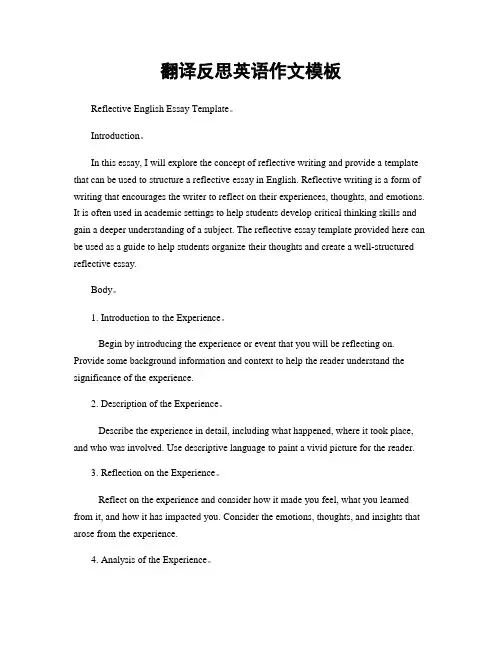
翻译反思英语作文模板Reflective English Essay Template。
Introduction。
In this essay, I will explore the concept of reflective writing and provide a template that can be used to structure a reflective essay in English. Reflective writing is a form of writing that encourages the writer to reflect on their experiences, thoughts, and emotions. It is often used in academic settings to help students develop critical thinking skills and gain a deeper understanding of a subject. The reflective essay template provided here can be used as a guide to help students organize their thoughts and create a well-structured reflective essay.Body。
1. Introduction to the Experience。
Begin by introducing the experience or event that you will be reflecting on. Provide some background information and context to help the reader understand the significance of the experience.2. Description of the Experience。
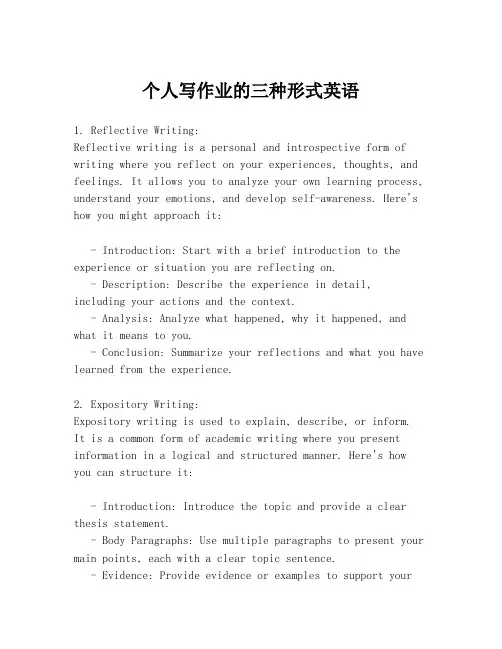
个人写作业的三种形式英语1. Reflective Writing:Reflective writing is a personal and introspective form of writing where you reflect on your experiences, thoughts, and feelings. It allows you to analyze your own learning process, understand your emotions, and develop self-awareness. Here's how you might approach it:- Introduction: Start with a brief introduction to the experience or situation you are reflecting on.- Description: Describe the experience in detail,including your actions and the context.- Analysis: Analyze what happened, why it happened, and what it means to you.- Conclusion: Summarize your reflections and what you have learned from the experience.2. Expository Writing:Expository writing is used to explain, describe, or inform. It is a common form of academic writing where you present information in a logical and structured manner. Here's how you can structure it:- Introduction: Introduce the topic and provide a clear thesis statement.- Body Paragraphs: Use multiple paragraphs to present your main points, each with a clear topic sentence.- Evidence: Provide evidence or examples to support yourpoints.- Conclusion: Summarize the main points and restate the thesis in a new way.3. Narrative Writing:Narrative writing tells a story. It's a way to recount personal experiences or events in a chronological order. Here's an outline for narrative writing:- Introduction: Introduce the setting and characters, and provide a brief overview of the story.- Rising Action: Describe the events leading up to the main event or climax.- Climax: The turning point or most exciting part of the story.- Falling Action: Describe the events that follow the climax and lead to the conclusion.- Conclusion: End the story with a resolution or a reflection on the events.Each of these forms of writing serves a different purpose and requires a different approach. Reflective writing is about self-exploration, expository writing is about presenting information, and narrative writing is about storytelling.。
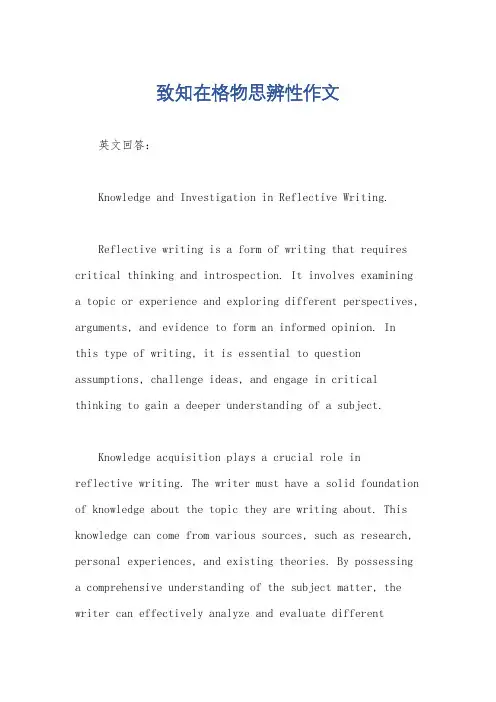
致知在格物思辨性作文英文回答:Knowledge and Investigation in Reflective Writing.Reflective writing is a form of writing that requires critical thinking and introspection. It involves examining a topic or experience and exploring different perspectives, arguments, and evidence to form an informed opinion. Inthis type of writing, it is essential to question assumptions, challenge ideas, and engage in critical thinking to gain a deeper understanding of a subject.Knowledge acquisition plays a crucial role inreflective writing. The writer must have a solid foundation of knowledge about the topic they are writing about. This knowledge can come from various sources, such as research, personal experiences, and existing theories. By possessing a comprehensive understanding of the subject matter, the writer can effectively analyze and evaluate differentviewpoints and form well-informed conclusions.In reflective writing, the writer must also engage in critical thinking to challenge assumptions and question ideas. This involves examining the strengths and weaknesses of different arguments, identifying biases, and considering alternative perspectives. By engaging in critical thinking, the writer can avoid making hasty generalizations and develop a balanced and nuanced understanding of the topic.Thoughtful exploration of different perspectives is another important aspect of reflective writing. This involves considering multiple viewpoints, examining the underlying assumptions and values of different arguments, and understanding the complexities of the topic. By exploring different perspectives, the writer can broaden their understanding and develop a more comprehensive and well-rounded opinion.中文回答:致知在格物思辨性作文。
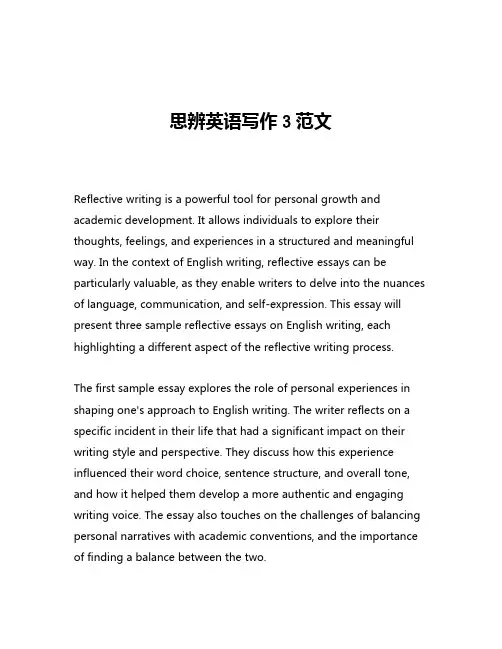
思辨英语写作3范文Reflective writing is a powerful tool for personal growth and academic development. It allows individuals to explore their thoughts, feelings, and experiences in a structured and meaningful way. In the context of English writing, reflective essays can be particularly valuable, as they enable writers to delve into the nuances of language, communication, and self-expression. This essay will present three sample reflective essays on English writing, each highlighting a different aspect of the reflective writing process.The first sample essay explores the role of personal experiences in shaping one's approach to English writing. The writer reflects on a specific incident in their life that had a significant impact on their writing style and perspective. They discuss how this experience influenced their word choice, sentence structure, and overall tone, and how it helped them develop a more authentic and engaging writing voice. The essay also touches on the challenges of balancing personal narratives with academic conventions, and the importance of finding a balance between the two.In the second sample essay, the writer focuses on the process of self-reflection and its impact on their writing development. They describe how they engaged in regular self-assessment, critically analyzing their strengths, weaknesses, and areas for improvement. The essay delves into the writer's thought processes as they grappled with issues such as organization, clarity, and coherence, and how they used this self-reflection to refine their writing skills over time. The writer also highlights the value of feedback from peers and instructors, and how incorporating diverse perspectives can lead to meaningful growth as a writer.The third and final sample essay examines the relationship between reflective writing and the writer's evolving understanding of the English language. The writer reflects on their journey of learning and mastering English, from the initial challenges of vocabulary and grammar to the deeper exploration of linguistic nuances and cultural contexts. They discuss how their reflective writing practice has helped them develop a more nuanced appreciation for the complexities of the English language, and how this understanding has in turn enriched their own writing. The essay also touches on the role of research and critical analysis in enhancing one's grasp of English, and how these skills can be applied to various writing tasks.Throughout these three sample essays, the common thread is the power of reflection to deepen one's understanding of English writingand to foster personal growth as a writer. Each essay demonstrates how reflective writing can be a transformative process, one that enables writers to explore their own experiences, thought processes, and linguistic development in meaningful and insightful ways. By delving into these reflective essays, readers can gain a deeper appreciation for the value of reflective writing in the context of English language and literature, and perhaps be inspired to embark on their own reflective writing journeys.。
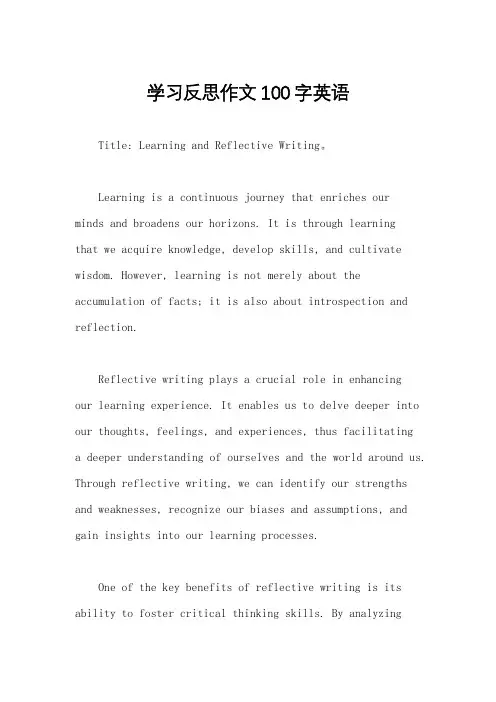
学习反思作文100字英语Title: Learning and Reflective Writing。
Learning is a continuous journey that enriches ourminds and broadens our horizons. It is through learningthat we acquire knowledge, develop skills, and cultivate wisdom. However, learning is not merely about the accumulation of facts; it is also about introspection and reflection.Reflective writing plays a crucial role in enhancingour learning experience. It enables us to delve deeper into our thoughts, feelings, and experiences, thus facilitatinga deeper understanding of ourselves and the world around us. Through reflective writing, we can identify our strengths and weaknesses, recognize our biases and assumptions, and gain insights into our learning processes.One of the key benefits of reflective writing is its ability to foster critical thinking skills. By analyzingand evaluating our experiences, we learn to question assumptions, consider alternative perspectives, and make informed judgments. This critical thinking ability is essential not only for academic success but also for navigating the complexities of everyday life.Moreover, reflective writing promotes metacognition, which is the awareness and understanding of one's own thought processes. When we engage in reflective writing, we are forced to confront our cognitive processes, such as how we learn, how we problem-solve, and how we make decisions. This metacognitive awareness allows us to become more strategic and intentional learners, capable of adapting our approach to different situations and challenges.Furthermore, reflective writing encourages self-awareness and personal growth. By examining our thoughts, emotions, and behaviors, we gain insight into our strengths and weaknesses, values and beliefs, and aspirations and fears. This self-awareness empowers us to make positive changes in our lives, whether it be developing new skills, overcoming obstacles, or pursuing our passions.In addition, reflective writing fosters empathy and compassion towards others. By reflecting on our own experiences, we gain a deeper understanding of the experiences of others. This empathy enables us to connect with people from diverse backgrounds and perspectives, fostering mutual respect and understanding.In conclusion, learning and reflective writing are intrinsically linked, each enhancing the other in a continuous cycle of growth and self-discovery. By engaging in reflective writing, we not only deepen our understanding of ourselves and the world but also cultivate essential skills and qualities that will serve us well throughout our lives. So let us embrace the power of reflective writing as a tool for learning, growth, and transformation.That's a brief, 100-word essay, focusing on the importance of reflective writing in the learning process.If you need a longer version, I can expand upon the ideas and provide more examples. Just let me know!。
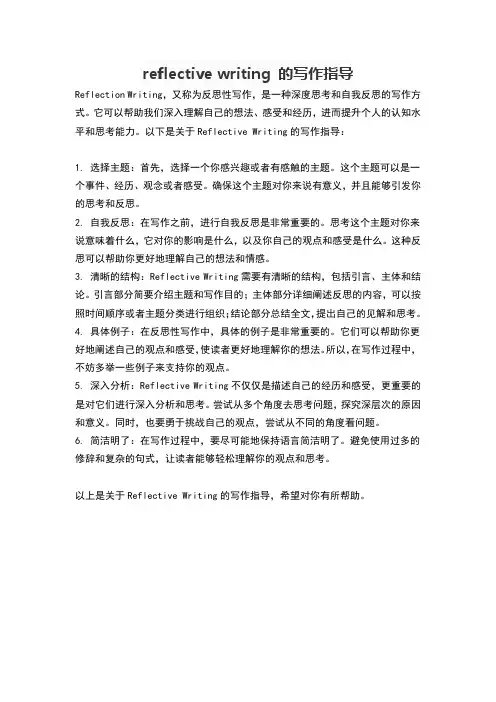
reflective writing 的写作指导Reflection Writing,又称为反思性写作,是一种深度思考和自我反思的写作方式。
它可以帮助我们深入理解自己的想法、感受和经历,进而提升个人的认知水平和思考能力。
以下是关于Reflective Writing的写作指导:1. 选择主题:首先,选择一个你感兴趣或者有感触的主题。
这个主题可以是一个事件、经历、观念或者感受。
确保这个主题对你来说有意义,并且能够引发你的思考和反思。
2. 自我反思:在写作之前,进行自我反思是非常重要的。
思考这个主题对你来说意味着什么,它对你的影响是什么,以及你自己的观点和感受是什么。
这种反思可以帮助你更好地理解自己的想法和情感。
3. 清晰的结构:Reflective Writing需要有清晰的结构,包括引言、主体和结论。
引言部分简要介绍主题和写作目的;主体部分详细阐述反思的内容,可以按照时间顺序或者主题分类进行组织;结论部分总结全文,提出自己的见解和思考。
4. 具体例子:在反思性写作中,具体的例子是非常重要的。
它们可以帮助你更好地阐述自己的观点和感受,使读者更好地理解你的想法。
所以,在写作过程中,不妨多举一些例子来支持你的观点。
5. 深入分析:Reflective Writing不仅仅是描述自己的经历和感受,更重要的是对它们进行深入分析和思考。
尝试从多个角度去思考问题,探究深层次的原因和意义。
同时,也要勇于挑战自己的观点,尝试从不同的角度看问题。
6. 简洁明了:在写作过程中,要尽可能地保持语言简洁明了。
避免使用过多的修辞和复杂的句式,让读者能够轻松理解你的观点和思考。
以上是关于Reflective Writing的写作指导,希望对你有所帮助。
谈谈你对什么的理解反思作文英文回答:To me, reflective writing is a form of self-expression and introspection. It is a process of looking back on my experiences, thoughts, and emotions, and analyzing them in order to gain a deeper understanding of myself and the world around me. Reflective writing allows me to explore my own thoughts and feelings, and to make connections between different experiences and ideas. It helps me to identify patterns and themes in my life, and to learn from my mistakes and successes. Through reflective writing, I am able to grow and develop as a person, and to make meaning out of my experiences.Reflective writing is not just about recounting what happened or how I felt in a particular situation. It goes beyond that, delving into the why and how of my thoughts and actions. It requires me to critically analyze my own beliefs and assumptions, and to question the validity of myown perspectives. Reflective writing is a way for me to challenge myself and to push the boundaries of my own thinking. It encourages me to consider alternative viewpoints and to be open to new ideas and perspectives.In my reflective writing, I often use personal anecdotes and examples to illustrate my points and to make my writing more relatable. I also incorporate idioms and colloquial expressions to add flavor and personality to my writing. For example, instead of saying "I was really nervous," I might say "I was as nervous as a cat on a hot tin roof." This not only makes my writing more engaging, but also allows me to express myself more authentically.Reflective writing is a valuable tool for personal growth and self-discovery. It helps me to make sense of my experiences, to learn from my mistakes, and to become a better version of myself. It allows me to explore my own thoughts and feelings, and to gain a deeper understanding of who I am and what I believe. Reflective writing is not just a means of expression, but also a way of learning and evolving.中文回答:对我来说,反思性写作是一种自我表达和内省的形式。
教资作文必背模板套用范文英文回答:Introduction。
Teaching is a noble profession that shapes the lives of young minds. As a future educator, it is imperative to possess a strong foundation in pedagogical theories and practices. Reflective writing plays a crucial role in developing effective teaching skills by facilitating self-assessment and continuous improvement.Paragraph 1: Importance of Reflective Writing。
Reflective writing provides educators with a structured process to examine their teaching practices, identify areas for improvement, and enhance their pedagogical knowledge. It allows teachers to critically analyze their lessons, student interactions, and overall classroom environment. Through reflection, educators can gain valuable insightsinto their strengths and weaknesses, leading to more effective and responsive instruction.Paragraph 2: Process of Reflective Writing。
reflectivewriting范文600字When you see this letter,you may have begun to face the high school entrance examination.I am your shadow in the second year of junior high school.I have something to say to you.Life is difficult everywhere.Sometimes you just need to do more by yourself,and you may succeed in what you want to accomplish.Perhaps the biggest problem you are facing at present is the quarrel with your parents.You are in puberty.You grow taller and stronger.You are no longer the weak little boy in the past,but now you have grown into an indomitable man.You may already have some opinions on some issues,and you don't need too much guidance from your parents.But in the eyes of your parents,you are just a child.You can think about what has been supporting you in school,life,eating and so on.Yes,it is their hard work and efforts.Mother gets up early and goes to bed late for your school.Father also works hard at home all day.It's not easy for them to do it for you,so you can try to eliminate the quarrel with them.Sit down and chat with them calmly.Talk more about what's on your mind,so that your relationship with them may be closer.As for my grandparents,I don't want to say anything more.Grandma is sick.What about Grandpa?I also need to eat*on time.I can't drink.You should remind him every daythat you have grown up and are no longer that weak little boy.Most of the quarrels between them are because of you,so don't talk much at home and try to be strict with yourself.Entering the third year of junior high school,the most likely thing to face is the pressure on learning.At this time,the teacher is your biggest helper.They guide you in your study.Therefore,I believe that everything the teacher does is for you.This is something to remember.Perhaps the game is the biggest"time eating ghost"at this time.It should quit.After all,it can only bring you short-term happiness,but in the long run.He's just wasting your study time.It's no use.I am on the edge of playing and not playing,dying.At that time,you may not be.Remember,you must be able to withstand bad temptations and lose your ambition by playing with things.Therefore,entering a good high school is not only for your own future.It is more to let the people who love you and the people you love live better in the future.Your task now is to study hard.Live a perfect life and make your every day full.Having said so much,in fact,what I want to say to you most is just one thing-black hair doesn't know how to study hard early,and white head regrets studying e on,believe in yourself,you will be better in the future.。
reflective写法Reflective WritingReflective writing is a valuable and effective tool for self-reflection and personal growth. It allows individuals to explore their thoughts, feelings, and experiences, and gain insight into themselves and their actions. In this article, we will explore the characteristics of reflective writing, its benefits, and provide some tips on how to incorporate it into your daily life.1. Understanding Reflective WritingReflective writing is a process of introspection and self-analysis. It involves examining and exploring personal experiences, thoughts, and emotions, and critically analyzing their impact on oneself. It encourages individuals to think deeply about their actions and behaviors, and reflect on them in a meaningful way.2. Benefits of Reflective WritingReflective writing offers numerous benefits that contribute to personal and professional development. Some of the key advantages include:2.1 Self-Awareness: Reflective writing helps individuals gain a better understanding of themselves and their motivations. Through introspection, they can identify their strengths, weaknesses, and areas for improvement.2.2 Critical Thinking: Engaging in reflective writing enhances critical thinking skills. It encourages individuals to examine their experiences from multiple perspectives, evaluate their choices, and identify patterns or recurring themes.2.3 Emotional Intelligence: Reflective writing allows individuals to explore and express their emotions in a safe and non-judgmental way. It promotes self-regulation and helps develop emotional intelligence.2.4 Decision Making: Regularly engaging in reflective writing can improve decision-making skills. By reflecting on past experiences, individuals can make more informed choices and avoid repeating past mistakes.3. Tips for Effective Reflective WritingTo make the most of reflective writing, consider the following tips:3.1 Create a Reflective Routine: Set aside dedicated time for reflective writing. It can be daily, weekly, or even monthly. Consistency is key in developing a reflective practice.3.2 Choose a Suitable Setting: Find a quiet and comfortable space where you can reflect without distractions. This will help you focus and immerse yourself in the reflective process.3.3 Use Prompts or Questions: If you're unsure where to start, use prompts or questions to guide your reflection. Examples could include "What did I learn from this experience?" or "How can I apply this lesson to future situations?"3.4 Be Honest and Authentic: Reflective writing is most effective when you are open and honest with yourself. Don't shy away from exploring challenging emotions or confronting difficult experiences.3.5 Consider Different Perspectives: When reflecting, try to consider multiple perspectives, including your own and those of others involved in the situation. This will broaden your understanding and provide a more comprehensive reflection.4. Incorporating Reflective Writing in Various SettingsReflective writing can be applied to different areas of life, including education, career development, and personal growth. Here are some examples:4.1 Education: Reflective writing is commonly used in academic settings to encourage students to analyze their learning experiences and apply critical thinking skills to their studies.4.2 Professional Development: Reflective writing can be beneficial for professionals seeking to enhance their skills and grow in their careers. It allows individuals to reflect on their achievements, challenges, and identify areas for improvement.4.3 Personal Growth: Reflective writing is a powerful tool for personal growth and self-reflection. It can help individuals navigate life challenges, celebrate successes, and make positive changes.5. ConclusionIn conclusion, reflective writing is a valuable practice that facilitates self-reflection, critical thinking, and personal growth. By dedicating time to reflect on our experiences and emotions, we can gain a deeper understanding of ourselves and make informed decisions. Incorporating reflective writing into our daily lives can lead to enhanced self-awareness, improved emotionalintelligence, and better overall well-being. Start your reflective writing journey today and unlock the power of self-reflection.。
Reflective writing
By Lucky Wang I found an article by Dr. Yasheng Huang that was very interesting and he gave many examples to support his theory. Although many ideas he mentioned I agree, but there were also some points that I’d like to argue.
Firstly, I would like to answer the question that is also the title of his article: Is the Chinese Democracy helpful for the economic development? I believe the answer is yes which is opposite with Dr. Huang’s answer. I will outline my reasons and use examples to support my standpoint.
Firstly, I should admit that many friends of mine believe Chinese democracy is harmful to Chinese economic development although most of them live in China right now. According to Dr. Huang’s article, he believed that the resource distribution of China is not equal, and this situation has been affecting Chinese people, especial those people live in poverty, very deeply. But I think this situation is acceptable. That
is mainly because history reason, as far as I know, when the People’s Republic of China established, the resource distributed equally, but after many disasters such as The Great Cultural Revolution, the economic and culture gap between people start growing, and until today the gap is still existence. But general speaking, the Chinese economic level per person is better than 20 years ago. Taking me as an example, when I was 2 or 3 years old, my family just could afford the daily bills, but today my parents can afford the charge of oversea education.
Secondly, as most people know that China is one of the countries that have the most developed public traffic system. But according to Dr. Huang’s study, he compared the GDP between China and India and obtained this conclusion. But I compare same think in a different way, according to the study of Chinese and Indian export volume reports in 2011, the number of Chinese export volume was about 2343 billion dollars, which was about nine times bigger than this number of India. And with this export volume, Chinese public traffic system played a big role. So I believe that the highly developed public traffic system, which contributed by Chinese Democracy, have a positive effect on economic
development.
Thirdly, as Dr. Huang’s theory, Chinese Democracy restrain the freedom of the economic market. For example, Chinese government control the price of electricity and drug. If Chinese government authorize those companies such as power companies to control the price themselves, maybe some disasters have already happened. The main reason is that the unstable public opinion situation, which means Chinese people are usually easy to believe public opinions or rumors. For example, in 2009, the news of Japanese nuclear resource was revealed into the sea published around the China. Many people believed that the salt that made after that event is harmful to human bodies, people rush to bought salt just because a theory that can’t be t ested, if the economic markets were free at that time, many people would not afford the price of salt which may cause panic in public.
At least, I enjoy reading his article, although there are some points I can’t agree. But what important is causing people thinking about this question whatever you agree or disagree, and I think this article will help me in the future.。